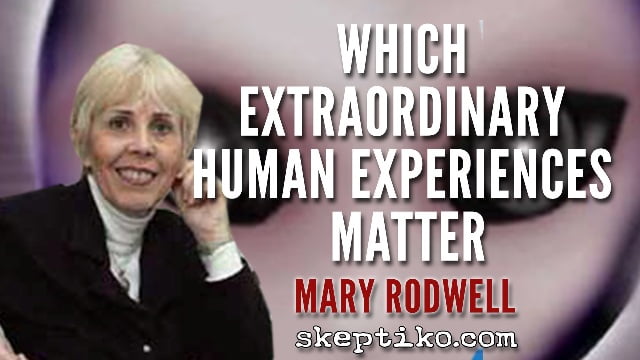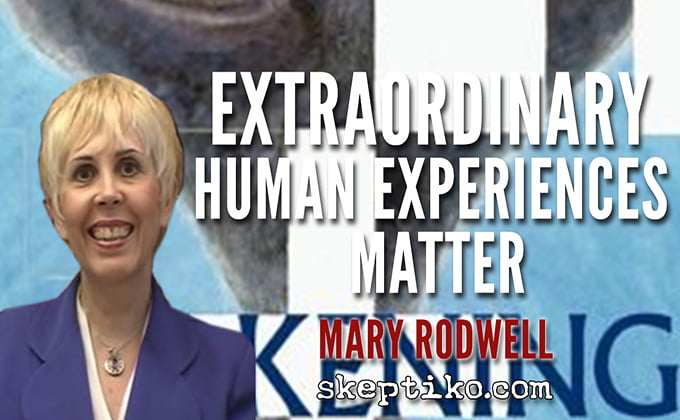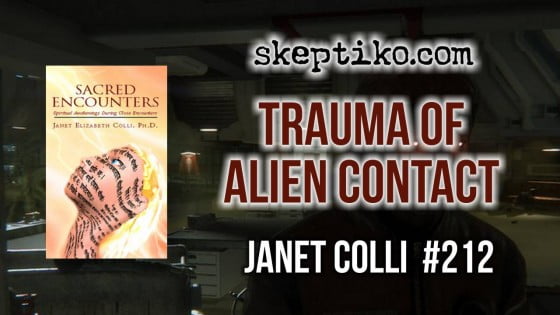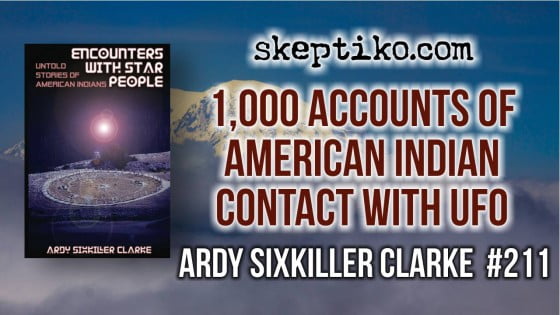Whitley Strieber experienced military grade torture long before he encountered the visitors. Alex Tsakiris: ...they intentionally try...
Tag: others
Mary Rodwell’s 3,000 Cases Suggest Ongoing Genetic Manipulation |423|
Mary Rodwell is a trained therapist who's 3,000+ cases suggest an ongoing genetic manipulation experiment. photo by: Skeptiko ...
Robbie Graham Busts the UFO Paradigm |358|
Robbie Graham and Robert Brandstetter challenge us to look beyond UFOs, extraterrestrials and disclosure. photo by: Skeptiko On this episode of...
Dr. John Brandenburg – Plasma physicist gives inside look at outsourced UFO research |325|
Dr. John Brandenburg's interview with Gordon White reveals inner workings of government secret space program. photo by: Skeptiko Every since Gordon...
First comprehensive academic survey of alien contact experience. Please continue to ignore|308|
Researcher Mary Rodwell discusses FREE's first comprehensive survey of alien contact experience. photo by: Chris Radcliff When I was a kid I was...
233. Mary Rodwell Which Extraordinary Human Experiences Matter
Click here for YouTube version Click here for forum discussion Interview with the alien encounter researcher Mary Rodwell examines the...
231. Dr. David Jacobs Dismisses Spiritual Alien Abduction Stories
Click here for YouTube version Click here for forum discussion Click here to post comments on AlexTsakiris.com Part two of an interview...
230. Dr. David Jacobs Claims Academia Has Abrogated Responsibility to Investigate Alien Contact
Click here for YouTube version Click here for forum discussion Click here to post comments on AlexTsakiris.com Interview with alien...
228. Mary Rodwell Advocates for Alien Contactees
Click here for YouTube version Click here for forum discussion Click here to post comments on AlexTsakiris.com Interview with UFO and...
212. Clinical Psychologist Dr. Janet Colli Treats Trauma of Alien Contact Experience
Interview explores the trauma and eventual spiritual transformation of those reporting alien contact. Join Skeptiko host Alex Tsakiris for an interview with Dr. Janet Colli author of, Sacred Encounters: Spiritual Encounters During Close Encounters. During the interview Colli talks about how the trauma caused by these experiences: Alex Tsakiris: Suppose you have an Iraqi war veteran who walks into your office and says, “I’m suffering post-traumatic stress syndrome,” which 20 years ago was highly controversial, but now we’d say, “Okay,” and you’d have a series of protocols you might take that person through. What are the limits on what you can do with someone like that versus what you do with someone who comes in and says, “I think I had an encounter with alien beings and I’ve had this for a long time and it’s really causing me a lot of stress.” As a clinician, how do you deal with those two situations? How are they similar; how are they different? Dr. Janet Colli: I would say that the nervous system doesn’t make up trauma. The signs of trauma are pretty well recognized now. That knowledge and those experiences pretty much overwhelmed all of the questions of are people making up things? You want to treat it as trauma and to some degree respect what people are saying even if you yourself are not sure of the so-called objective reality of what happened. You want to be treating that using trauma methods. I use the EMDR a lot, Eye Movement Desensitization and Reprocessing, and it really does help the nervous system process things that are difficult. (continued below) Dr. Colli's Website Click here for YouTube version Click here for forum discussion Play It Listen Now: Download MP3 (44 min.) Read It: (pre-interview) Dr. Janet Colli: How would you characterize your audience, if I might ask? Alex Tsakiris: No, I’m glad you did. My audience is very open-minded and progressive-minded so we just call the skeptical nonsense for what it is and say, “That’s just a crazy, irrational worldview that just really doesn’t make sense.” But in the spirit of doing that, I think we have to remain skeptical as well, and when we get into consciousness there are a lot of different people saying a lot of different things out there.
...211. Montana State University’s Ardy Sixkiller Clarke Compiles 1,000 Accounts of American Indian Contact With UFO Phenomena
Interview explores the personal accounts of Native Americans and “Star People”. Join Skeptiko host Alex Tsakiris for an interview with Dr. Ardy Sixkiller Clarke author of, Encounters with the Star People: Untold Stories of American Indians. During the interview Clarke talks about how a spiritual worldview affects the accounts she’s collected: Alex Tsakiris: If we unpack these experiences with American Indians that you’re talking about, we assume going in that there’s a different spiritual orientation. I think we assume—whether this is true or not—that in American Indian cultures there’s are a different set of givens. What would you say about that? Is that true? Is that a misconception? And, how might that play into these accounts of encounters with alien beings? Dr. Ardy Clarke: Well, I think again you have to separate tribes. There are some tribes where it’s forbidden to even speak the name of a dead person. Where in other tribes they believe that when someone dies they stay with them for a year. Their spirit remains with them for a year and then after a year they hold a ceremony to release that person. They have ceremonies where they can speak with those who have passed on. They have ceremonies where they can speak with the Ancients or where the Ancients come to them and give them knowledge and answer their prayers or their questions. So it depends on the tribal group, and it’s difficult for me to say, as a general rule, there is this spiritual connection. But there definitely is with some of the tribes. There’s no question about it. Some of the tribes actually talk about the trip across the Milky Way. That when you die you cross the path of the Milky Way. You’ve got a common theme there that the cosmos plays so much a part in afterlife and death and the ability of the deceased that they never really die. They just move on into another dimension and that they can come back and communicate with the living. Alex Tsakiris: See, I just think no matter what subtle differences you might have in that worldview, I think a worldview that incorporates this spiritual dimension puts you in a completely different place in terms of dealing with the UFO phenomena. Dr. Ardy Clarke: I do, too, because Native people on a whole are accepting of it. They aren’t skeptical of it. So if you approach it from a perspective that it is part of the universe and that it’s nothing to fear, then that’s one view. But to be skeptical of it and not believe what you’ve seen or to deny that it occurs is a totally different worldview. Dr. Clarke's Website Click here for YouTube version Click here for forum discussion Play It Listen Now: Download MP3 (45 min.) Read It: Today we welcome author and Professor Emeritus from Montana State University, Dr. Ardy Sixkiller-Clark to Skeptiko. Dr. Clarke has a long, distinguished academic career working with indigenous populations and is here to talk about her fascinating new book, Encounters With Star People. Dr. Clarke, welcome to Skeptiko. Thanks so much for joining me. Dr. Ardy Clarke: It’s my pleasure. Alex Tsakiris: Dr. Clarke, tell us about your book. Obviously how you came to write it. Maybe a little bit about the methodology you used. You’ve worked for a long time with Native Americans and are familiar with some of the cultural aspects of that. How did you come to write this book?
...176. Dr. Jeffrey Kripal On Science Fiction As a Trojan Horse For the Paranormal
Interview with author and Professor of Religious Studies examines how paranormal experiences have fueled the work of famous science fiction and comic book authors. Join Skeptiko host Alex Tsakiris for an interview with Rice University Professor of Philosophy and Religious Thought, and author of, Mutants and Mystics: Science Fiction, Superhero Comics, and the Paranormal, Dr. Jeffrey Kripal. During the interview Kripal discusses how science and culture affect our worldview: Alex Tsakiris: It’s also interesting how you used the term “Trojan Horse” because one of the themes of the book is this indictment against science as we know it. Science that insists not only that the paranormal doesn’t exist, but that it’s impossible. Dr. Jeff Kripal: Basically what I’m trying to get out there is that the thoughts we think and the worldviews we inhabit are determined by our cultures. The reigning culture is this scientific materialism that essentially argues that we’re only matter and that we can never get outside of our bodies and the particular historical context in which we find ourselves. What happens to human beings all the time is that they have these sorts of extraordinary experiences that do seem to take them outside of their context, outside their bodies, even outside of space and time which is how my artists and authors talk about it today. So I’m simply pointing out that those sorts of experiences are dismissed or ignored because there’s no way to fit them into the reigning paradigm. But once we just open up the paradigm, then they make actually a good deal of sense. They actually become really interesting and powerful experiences to take into consideration. You can’t think yourself out of a box with the terms of the box. You have to find some other way to get out of the box. Alex Tsakiris: Right, but the paradox is that that’s what we’re required to do. I mean, we’re reading this book in this here-and-now-reality and yet we’re exploring this very different reality. Maybe you want to expound on this idea of “human as two” that recurs in your writing. Dr. Jeff Kripal: The book came out of a series of interviews and readings of artists and authors who create these forms of popular culture. A lot of them are very clear that when they have these paranormal experiences they were not in their normal sense of self or their normal psyches. The experience is essentially one of being split in two where part of the human being is outside of space and time and part of the human being is in space and time. Dr. Jeffrey Kripal's Website Play It: Download MP3 (62 min.) Read It: Alex Tsakiris: Today we welcome back Dr. Jeff Kripal to Skeptiko. Jeff holds a chair in Philosophy and Comparative Religion at Rice University in Houston. He was a very popular guest when he joined me last year to talk about his excellent book, Authors of the Impossible. He’s back today to talk about his latest, Mutants and Mystics: Science Fiction, Superhero Comics, and the Paranormal. Jeff, thanks for joining me. Welcome back. Dr. Jeff Kripal: Thanks for having me back again.
...159. Stanton Friedman on Extended Human Consciousness and Mind Control
UFO researcher sees evidence of telepathy in the accounts of UFO witnesses. Join Skeptiko host Alex Tsakiris for an interview with Stanton Friedman, author of Science Was Wrong. During the interview Friedman discusses the implications of his research for human consciousness: Alex Tsakiris: I want to talk about extended consciousness in terms of the research you’ve done because there’s this whole controversy within the field that wants to push everything into the psycho-social explanation. But at the same time we do have to acknowledge, as you did in your work with the famous abduction case of Betty and Barney Hill that we do have reports of telepathy, mind control, psychokinesis, and all the rest. I’m wondering what that evidence tells us about ourselves and our human capabilities that extend beyond what we normally think of as our conscious experience. Stanton Friedman: Well, it’s a very important point because I’m convinced that any advanced civilization will know about telepathy and mind control and communication at a distance. It really came home to me when I was standing at the exact location where Barney Hill was standing when the saucer was over their car and he’s looking through binoculars at the crew on board. For no good reason, they jumped back in the car, very frightened, and they get off the main road, Route 3, and they go onto a secondary road. Then they go onto a dirt road --which Barney would never have done. And he winds up alongside the only place in the area where you could land a, let’s say 80-foot in diameter, flying saucer. It was a sandy area, there were trees all over the place, but this area was big enough to get a saucer like the one they described down. It was clear proof to me that these guys were directing his actions. It seems to me eminently clear that these guys have capabilities—as the only simple term I know—to do things that we don’t look upon as being respectable. Such as mind-reading, mind control, and getting people to forget. Stanton Friedman's Website Play It: Download MP3 (50:00 min.) Read It: Alex Tsakiris: Today’s guest was a nuclear physicist before becoming one of the best known and most well informed UFO researchers. I’m talking about Stanton Friedman and Stan, it’s a great pleasure and an honor to welcome you here today on Skeptiko. Stanton Friedman: I appreciate that. I always like doing it. I grew up with radio. I’m one of the old guys, you know. Put the pictures in my head instead of on a tube.
...115. Dr. Jeff Kripal Offers a Fresh Perspective on the Nature of Consciousness
Comparative Religions scholar and author of, Authors of the Impossible explores the link between consciousness and culture. Join Skeptiko host Alex Tsakiris for and interview with Rice University Religious Studies professor and author of, Authors of the Impossible, Dr. Jeff Kripal. During the interview Dr. Kripal discusses how a broad view of comparative religions might inform scientific debate on the nature of consciousness, "I have developed this model of consciousness and culture… I'm sure some people will read that it's always just culture. Other people will read it as saying I believe in some kind of absolute consciousness beyond our culture… but actually it's both. I'm trying to maintain this both/and thinking and not keep falling into this either/or." Dr. Kripal also discusses how this model might change our view of near-death experience science, "I'm not suggesting that near-death experiences are simply culture or nothing but local context. Not at all. I think consciousness is self-existent and does survive bodily death, but I also think it always, always, always expresses itself… through language and culture and context. So you're never outside of that. But you may be outside of it when you die. I mean, I don't know. If I've died before I don't remember it." Dr. Kripal also share his thoughts on how a new model of consciousness might impact religion, "I'm thinking more of creating a new religious worldview. Not me, personally, mind you, but as a culture. That's where the historian can speak here, too. When religious systems start out, nobody knows where they're going. They never, ever, ever come out of nowhere. They're always syntheses or fusions of the scientific knowledge of the time and the different cultures that are interacting. So where I place my hope isn't on Church A or Synagogue B or Scientist X. It's the future generations who can put this stuff together in a completely new way, which I think is almost inevitable." Check out Dr. Jeff Kripal's website Authors of The Impossible Podcast: Dean Radin Interview Play it: Download MP3 (61:00 min.) Read it: Alex Tsakiris: Today we're joined by the author of Authors of the Impossible: The Paranormal and the Sacred, a book that he's also developing into a documentary film, as well as a podcast titled, Impossible Talk. As an aside, I have to mention what a fine podcast it is. The interviews are just fantastic and Jeff brings this dialogue-between-colleagues style that's really enjoyable and quite insightful. He's also the head of the Department of Religious Studies at Rice University and is the author of several other interesting books I hope we have a chance to talk about. Dr. Jeff Kripal, thanks for joining me today on Skeptiko.
...
















